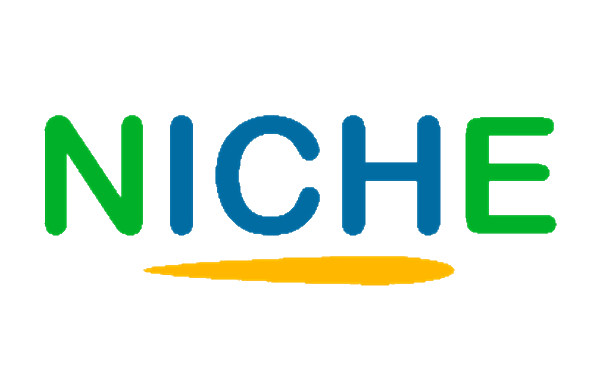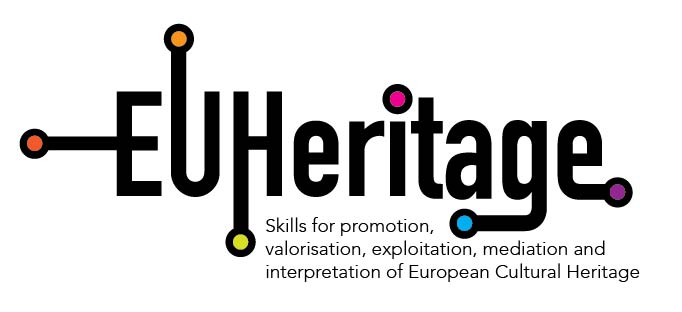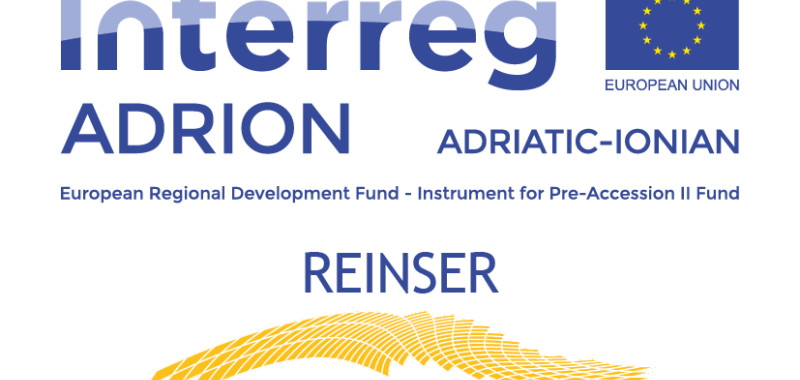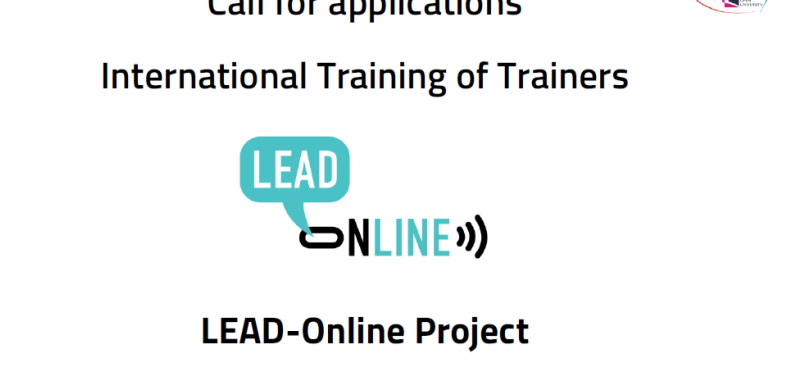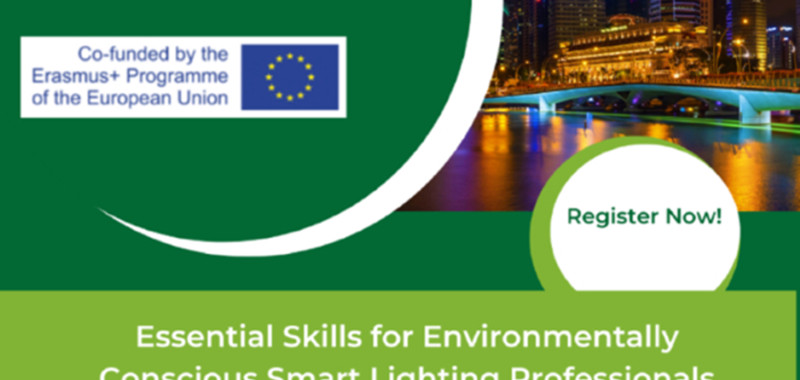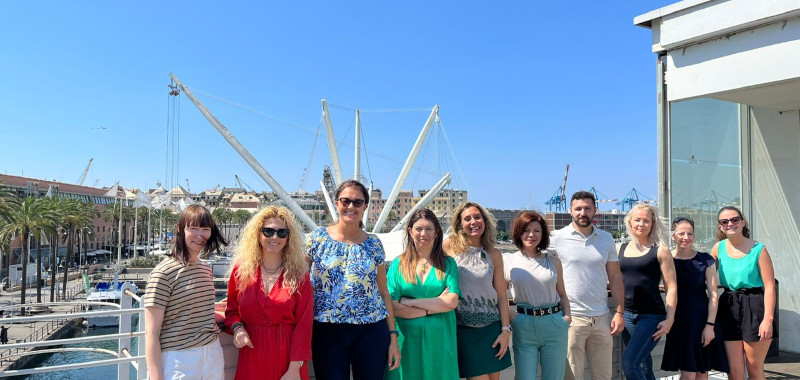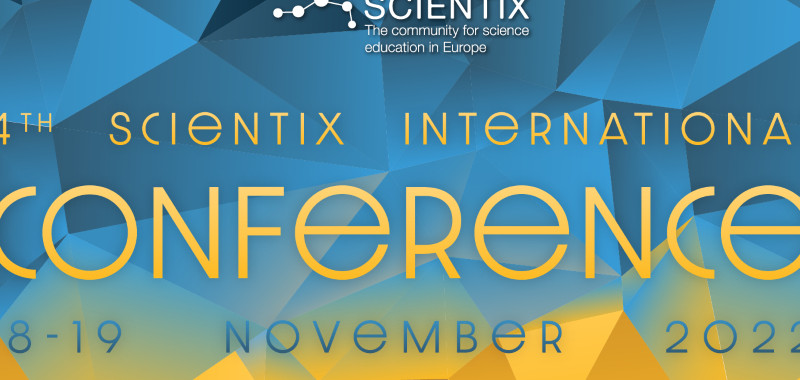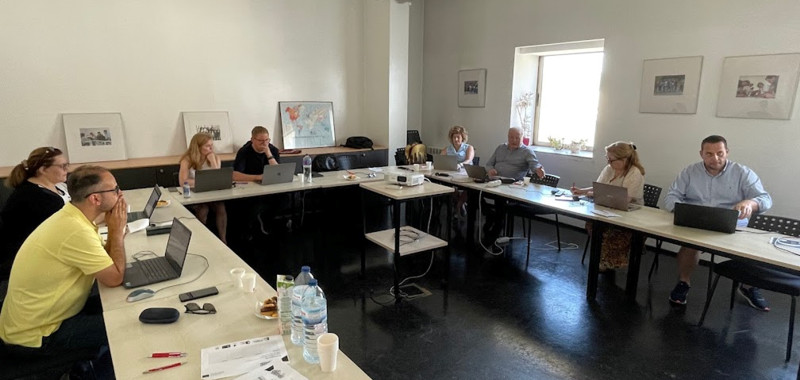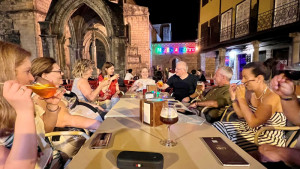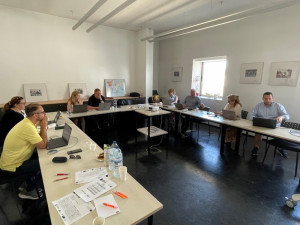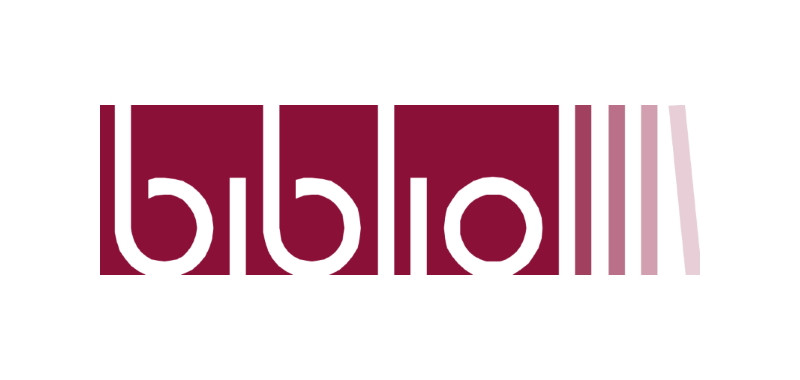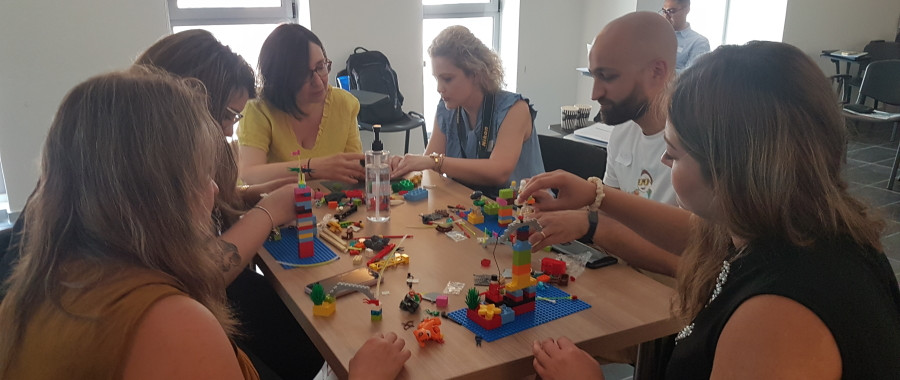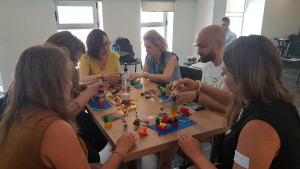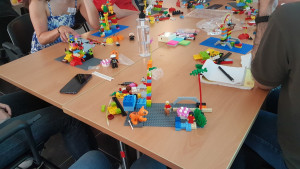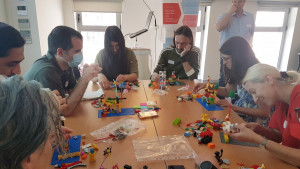Πρόσκληση σε Ημερίδα με τίτλο “Ενίσχυση της επιχειρηματικότητας στον τομέα της Άυλης Πολιτιστικής Κληρονομιάς»
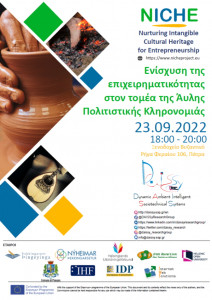 Η ερευνητική ομάδα DAISSy του Ελληνικού Ανοικτού Πανεπιστημίου σας προσκαλεί να συμμετάσχετε στην ημερίδα που διοργανώνει με τίτλο “ Ενίσχυση της επιχειρηματικότητας στον τομέα της Άυλης Πολιτιστικής Κληρονομιάς», η οποία θα πραγματοποιηθεί δια ζώσης, την Παρασκευή 23 Σεπτεμβρίου 2022 στις 18.00, στο Ξενοδοχείο Βυζαντινό (Ρήγα Φεραίου 106), στην Πάτρα.
Η ερευνητική ομάδα DAISSy του Ελληνικού Ανοικτού Πανεπιστημίου σας προσκαλεί να συμμετάσχετε στην ημερίδα που διοργανώνει με τίτλο “ Ενίσχυση της επιχειρηματικότητας στον τομέα της Άυλης Πολιτιστικής Κληρονομιάς», η οποία θα πραγματοποιηθεί δια ζώσης, την Παρασκευή 23 Σεπτεμβρίου 2022 στις 18.00, στο Ξενοδοχείο Βυζαντινό (Ρήγα Φεραίου 106), στην Πάτρα.
Η ομάδα DAISSy – ΕΑΠ συμμετέχει ως εταίρος στις δράσεις του έργου Nurturing Intangible Cultural Heritage for Entrepreneurship – NICHE [2020-1-IS01-KA202-065809], που χρηματοδοτείται από το πρόγραμμα Erasmus+ της Ευρωπαϊκής Επιτροπής. Το έργο NICHE (https://www.nicheproject.eu/), διάρκειας 24 μηνών, στοχεύει στην προώθηση της ανάπτυξης και της βιωσιμότητας στον τομέα της Άυλης Πολιτιστικής Κληρονομιάς (Intangible Cultural Heritage), δηλαδή όλων των πρακτικών, μορφών έκφρασης, γνώσεων ή δεξιοτήτων που συναποτελούν την πολιτιστική παράδοση ενός τόπου.
Η εκδήλωση απευθύνεται σε άτομα και εκπροσώπους ενώσεων, ιδρυμάτων και επιχειρήσεων σε τοπικό, εθνικό και ευρωπαϊκό επίπεδο. Συγκεκριμένα απευθύνεται σε επαγγελματίες πολιτισμού, διαχειριστές στον τομέα του πολιτισμού και τουρισμού, παρόχους επαγγελματικής εκπαίδευσης και κατάρτισης, συμβούλους επιχειρήσεων, διαχειριστές μικρομεσαίων επιχειρήσεων στον πολιτισμό και τουρισμό, φορείς που λαμβάνουν αποφάσεις, εκπροσώπους δήμων και πολιτιστικών συλλόγων καθώς και σε φοιτητές και αποφοίτους στον πολιτισμό και τουρισμό.
Θα δοθούν βεβαιώσεις συμμετοχής.
Για οποιαδήποτε πληροφορία μπορείτε να απευθυνθείτε στη διεύθυνση info@daissy.eap.gr
Δείτε το πρόγραμμα της ημερίδας εδώ.
Call for registrations to EUHeritage MOOC 2022 on the promotion and management of cultural heritage!
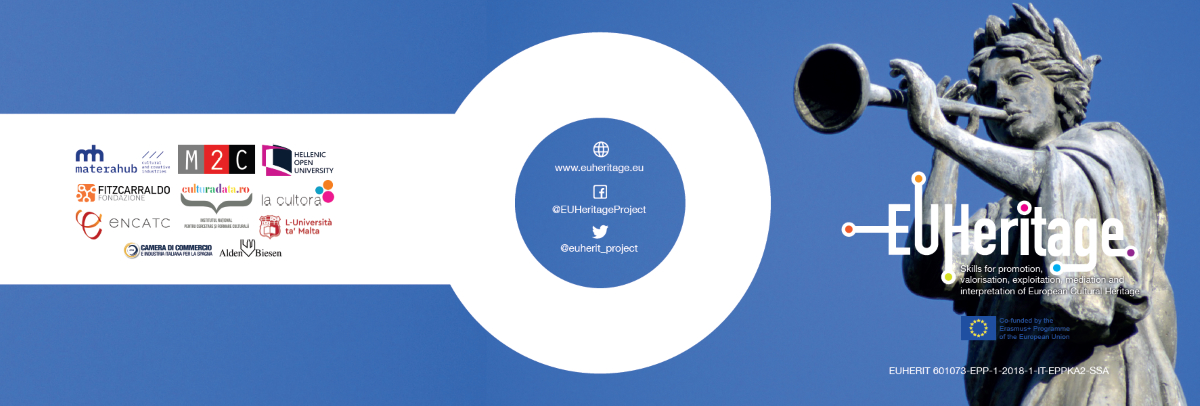
The DAISSy research group of Hellenic Open University (http://daissy.eap.gr/) re-launches the Massive Open Online Course (MOOC), developed in the framework of the European project EUHeritage: Skills for promotion, valorization, exploitation, mediation and interpretation of European Cultural Heritage (https://www.euheritage.eu/).
The project was funded under the Erasmus+/KA2/Sector Skills Alliances programme and created a new transnational curriculum for cultural professionals and students, focusing on digital and transferable competences as well as social skills linked to the ‘tourism experience’ in the cultural heritage sector. The project was implemented with the collaboration of 10 institutions from 8 European countries – the DAISSy group of HOU participated as the main technological partner of the project representing Greece.
The online training programme is offered again in 2022, by the MOOC Platform developed by the DAISSy team for the EUHeritage project. The online course starts on Monday 26 September 2022. The online course is offered free of charge, in English. Successful learners will be awarded with a Certificate of Completion and Online Open Badges!
REGISTER NOW at the link: https://forms.gle/o3f8uoqLgrMPWjL38 until 21st September 2022!
The detailed CALL for Expression of Interest can be found here and on the project website.
For more information about the EUHeritage project and other activities of the DAISSy research group:
- Website: http://daissy.eap.gr, https://www.euheritage.eu/
- Facebook: @DAISSyResearchGroup, @EUHeritageProject
- Linkedin: https://www.linkedin.com/in/daissyresearchgroup/
- Twitter: https://twitter.com/daissy_research, @EUHerit_project
- Instagram: @daissy_researchgroup
- Email: info@daissy.eap.gr
The DAISSy Research Group of the HOU announces the start of the registration for the Massive Open Online Course (MOOC) in Social Entrepreneurship, in Greek, English, French and Arabic. Registration has started!
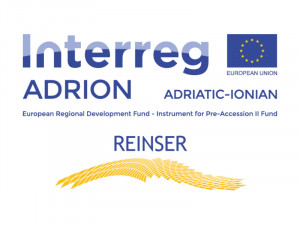 The DAISSy Research Group of the HOU announces the start of the registration for the Massive Open Online Course (MOOC) in Social Entrepreneurship, in Greek, English, French and Arabic. Registration has started!
The DAISSy Research Group of the HOU announces the start of the registration for the Massive Open Online Course (MOOC) in Social Entrepreneurship, in Greek, English, French and Arabic. Registration has started!
The DAISSY Research Group of the Hellenic Open University announces the start of the registration for the Massive Open Online Course (MOOC) in Social Entrepreneurship and invites you to register.
The MOOC in Social Entrepreneurship is open to anyone interested:
- get to know what the Social and Solidarity Economy is through specific examples and its actors,
- learn how a group is formed and operates, the cell of each Social and Solidarity Economy project
- to systematically look at ways of choosing which economic activity meets the objectives of the Social and Solidarity Economy
- to get acquainted with marketing techniques directly linked to the Social and Solidarity Economy
- to finally get to know technical tools (business plan creation, economic and technical planning, etc.) that will allow him/her to put into practice the objective of social change through the Social and Solidarity Economy.
- to launch or develop a business venture based on the principles of the Social and Solidarity Economy,
The MOOC is offered in four languages: Greek, English, French and Arabic.
It will start on 15 September 2022 and the participants will need three weeks in order to complete the course.
Participants who successfully complete the MOOC in Social Entrepreneurship will receive a certificate of completion. In addition, they will have the opportunity (under certain conditions) to receive support for the development of their business ideas that contribute to the economic integration of refugees based on the principles of Social and Solidarity Economy, in the framework of the Social Hackathon for the Economic Integration of Refugees through Social Entrepreneurship which will take place in Ioannina, from 9 to 12 October 2022.
Register for the MOOC in Social Entrepreneurship at the following link: https://bit.ly/3Q7AINs
MOOC in Social Entrepreneurship and Social Hackathon are implemented in the framework of the project “REInSER: Economic Integration of Refugees through Social Entrepreneurship”. The main objective of the REInSER project is to contribute to improving the prospects of refugees for economic, and, more broadly, social integration in the host countries of the Adriatic-Ionian region, using social economy approaches, and in particular those of social entrepreneurship.
The REInSER project is implemented in the framework of the Adriatic-Ionian Interreg ANDRION Transnational Cooperation Program funded by the European Regional Development Fund and the Instrument for Pre-Accession Assistance (IPA) II.
REInSER brings together 8 project partners from academia, business support organisations and local authorities gathering different expertise, knowledges and skills in 6 countries of the ADRION area, namely, Slovenia, Italy, Greece, BiH, Serbia and Croatia.
In Greece, the project partner is the DAISSY Research Group and the associated partners are the Special Service “ESPA Executive Structure, Employment & Social Economy Sector” of the Ministry of Labour and Social Affairs, ANKA, and e-Trikala.
More information on the DAISSy Research Group:
- Website : daissy.eap.gr
- Facebook : @DAISSyResearchGroup
- Linkedin : www.linkedin.com/in/daissyresearchgroup/
- Twitter : @daissy_research
- Instagram : @daissy_researchgroup
- Email : info@daissy.eap.gr
Call for applications – International Training of Trainers
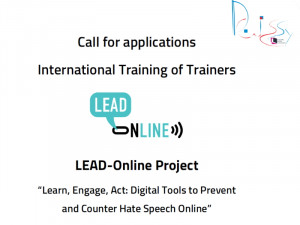 Η ερευνητική ομάδα DAISSy Research Group, στα πλαίσια του ευρωπαϊκού έργου LEAD-Online-Learn, Engage, Act: Digital Tools to Prevent and Counter Hate Speech Online, καλεί εκπαιδευτικούς, δημοσιογράφους, διαχειριστές λογαριασμών social media κ.α. που επιθυμούν να εκπαιδευτούν για να γίνουν φορείς αλλαγής σε σχέση με τη ρητορική μίσους στο διαδίκτυο, να στείλουν τις αιτήσεις τους για τη συμμετοχή στην εκπαίδευση “International Training of Trainers“, που θα λάβει χώρα στη Βιέννη, στις 14-16 Νοεμβρίου 2022.
Η ερευνητική ομάδα DAISSy Research Group, στα πλαίσια του ευρωπαϊκού έργου LEAD-Online-Learn, Engage, Act: Digital Tools to Prevent and Counter Hate Speech Online, καλεί εκπαιδευτικούς, δημοσιογράφους, διαχειριστές λογαριασμών social media κ.α. που επιθυμούν να εκπαιδευτούν για να γίνουν φορείς αλλαγής σε σχέση με τη ρητορική μίσους στο διαδίκτυο, να στείλουν τις αιτήσεις τους για τη συμμετοχή στην εκπαίδευση “International Training of Trainers“, που θα λάβει χώρα στη Βιέννη, στις 14-16 Νοεμβρίου 2022.
Για περισσότερες πληροφορίες δείτε την πρόσκληση. Οι θέσεις είναι περιορισμένες και θα τηρηθεί σειρά προτεραιότητας για τους επικρατέστερους υποψήφιους.
MOOC on Essential Skills for Environmentally Conscious Smart Lighting Professionals
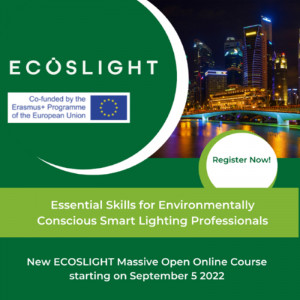 ECOSLIGHT consortium is happy to announce that the registration to its MOOC training program – Essential Skills for Environmentally Conscious Smart Lighting Professionals – is now open to all interested stakeholders! ECOSLIGHT is coordinated from the School of Applied Arts and Sustainable Design and the DAISSy research group of the Hellenic Open University.
ECOSLIGHT consortium is happy to announce that the registration to its MOOC training program – Essential Skills for Environmentally Conscious Smart Lighting Professionals – is now open to all interested stakeholders! ECOSLIGHT is coordinated from the School of Applied Arts and Sustainable Design and the DAISSy research group of the Hellenic Open University.
MOOC, which is freely accessible by anyone, aims at supporting lighting and wider construction industry professionals, or aspiring ones, to improve their lighting, digital, green, entrepreneurial, and life competences. It will offer specific learning modules aimed at enhancing know-how and skills in the fields related to:
- innovative, sustainable, and human-centric lighting systems and products,
- digital technologies for co-creation processes,
- entrepreneurial mindset and critical thinking.
ECOSLIGHT MOOC start date is 5th of September 2022, its duration is of 8 weeks. Additional information about the course can be found here.
Ready to enroll? Please complete the online registration form here.
DAISSy / HOU participated in the 2nd transnational partner meeting of the DigiPath project
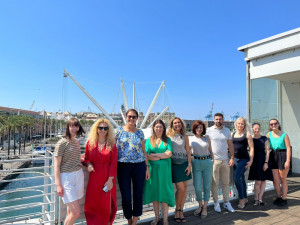 On July 12 and 13, 2022, the organization SI4life hosted the 2nd Transnational Project Meeting of the project DigiPath – Digital Education Readiness for VET Teachers through Tool Assisted Learning Pathways. The meeting was held at the facilities of Aquarium of Genova, in Genova, Italy, with the participation of the DAISSy research group of the Hellenic Open University and the organisations AFBB Akademie Furberufliche Bildung GMBH (Germany), TERCIFORMA — Estudos de Comércio e Serviços, SA (Portugal), Valencia Culinary Center S.L. (Spain) και Kauno buitiniu paslaugu ir verslo mokykla (Lithuania).
On July 12 and 13, 2022, the organization SI4life hosted the 2nd Transnational Project Meeting of the project DigiPath – Digital Education Readiness for VET Teachers through Tool Assisted Learning Pathways. The meeting was held at the facilities of Aquarium of Genova, in Genova, Italy, with the participation of the DAISSy research group of the Hellenic Open University and the organisations AFBB Akademie Furberufliche Bildung GMBH (Germany), TERCIFORMA — Estudos de Comércio e Serviços, SA (Portugal), Valencia Culinary Center S.L. (Spain) και Kauno buitiniu paslaugu ir verslo mokykla (Lithuania).
During the two-day meeting, the partners had the opportunity to discuss the main findings of the research conducted to VET institutions regarding teachers’ perspectives on digital teaching and the mapping of their digital skills development needs.
The research’s findings constituted the baseline for discussion and analysis of the design of the learning paths, development of the educational material, as well as the piloting of the blended course of DigiPath project.
In addition, horizontal issues of the project regarding the exploitation and promotion of its results, as well as its management, were discussed.
The DAISSy Research Group of the Hellenic Open University participates in all the Work Packages, undertaking the implementation of the e-learning platform that will support the pilot blended course of the project.
For more information on the CRISIS project and the activities of the DAISSy research group:
- Websites: http://daissy.eap.gr/en & https://crisisproject.eu/
- Facebook: @DAISSyResearchGroup
- Linkedin: https://www.linkedin.com/in/daissyresearchgroup/
- Twitter: https://twitter.com/daissy_research
- Instagram: @daissy_researchgroup
- Email: info@daissy.eap.gr
4th Scientix Conference – Call for contributions
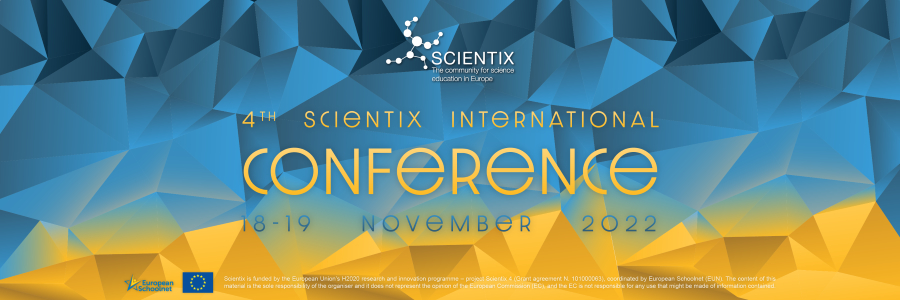
The 4th Scientix International Conference is one of the major science education networking events in Europe and will take place online 18 to 19 November 2022.
With only 2,000 places available, the goal of the conference is to provide an overview of the challenges and opportunities in science education in Europe and highlight the potential and possibilities that the Scientix community can bring about. Participation in the conference is free of charge and by registration only. Registration will be opened early September 2022. For more information about the conference please you visit this page: http://www.scientix.eu/conference
The Call for Contributions is now open to four different types of contributions:
- Plenary online presentations for STEM education projects
- Parallel online presentations on different topics related to STEM Education
- Digital Posters on different topics related to STEM education
- Hands-on online workshops
The submission deadline for the call for papers is 17 August 2022.
You can find more information on how to submit your contribution here: http://www.scientix.eu/conference/scx4/call-for-contributions
DAISSy / HOU participated in the 2nd transnational partner meeting of the CRISIS project
On July 7 and 8, 2022, the University of Minho hosted the 2nd transnational partner meeting of the European project CRISIS – Competences for Resilient Smart Cities’ Staff. The meeting was held at the facilities of the University of Minho in the city of Guimaraes, Portugal with the participation of the DAISSy research group of the Hellenic Open University, the University of Thessaly, the Fernuniversitat in Hagen (Germany) and EDEX ltd (Cyprus).
During the two-day meeting, the partners had the opportunity to discuss the dimensions of resilience of smart cities, the competencies required to effectively address these dimensions, but also the required proficiency levels of each capability. This discussion took place in the context of the development of a self-assessment tool for resilient smart cities’ staff, which aims at identifying potential competence gaps to propose alternative learning paths to address them.
In addition, the partners analyzed issues of curriculum design, development of the training kit, and pilot offering of the CRISIS project educational program. At the same time, horizontal issues of the project regarding the exploitation and promotion of its results, as well as its management, were discussed.
The DAISSy Research Group of the Hellenic Open University participates in all the Work Packages, undertaking the implementation of the e-learning platform that will support the pilot educational program of the project through a Massive Open Online Course (MOOC).
For more information on the CRISIS project and the activities of the DAISSy research group:
- Websites: http://daissy.eap.gr/en & https://crisisproject.eu/
- Facebook: @DAISSyResearchGroup
- Linkedin: https://www.linkedin.com/in/daissyresearchgroup/
- Twitter: https://twitter.com/daissy_research
- Instagram: @daissy_researchgroup
- Email: info@daissy.eap.gr
DAISSy-HOU links BIBLIO with the T4SVEN EU project!
 The DAISSy Research Group of the Hellenic Open University (#DAISSy #HOU), the Greek project partner, links BIBLIO (#digitalskills , @DigitalBiblio) with the “T4SVEN” EU project currently undergoing (KA226-A8A482F6).
The DAISSy Research Group of the Hellenic Open University (#DAISSy #HOU), the Greek project partner, links BIBLIO (#digitalskills , @DigitalBiblio) with the “T4SVEN” EU project currently undergoing (KA226-A8A482F6).
More precisely, the #T4SVEN project (Training 4 Skills in Virtual Environment) aims to develop a methodological framework and pilot an online training course to support Vocational Education Training (VET) teachers in the application of digital technologies to sector-specific skills training in digital or blended learning environments.
Through the T4SVEN activities, the VET trainers will improve their competencies, motivation and self-efficacy to create and deliver training in a virtual environment and positively reflect on the quality of remote work-based teaching and learning in the VET sector.
This will be achieved first by identifying a concept framework (Review, analysis and proposal of a conceptual framework of the digital pedagogy in VET, with a special focus on WBL), then by developing a digital course curriculum and a digital course focus on WBL, to continue by formulating a game-based, virtual reality educational platform and completing through a peer evaluation of the framework for VET teachers.
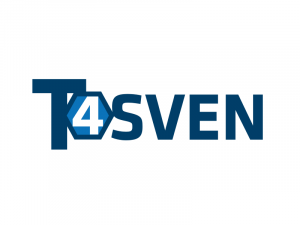 The T4SVEN project will equally strengthen international cooperation in the digital transformation of education and advance the inclusiveness of VET by developing an open source methodology for further transfer and adaptation.
The T4SVEN project will equally strengthen international cooperation in the digital transformation of education and advance the inclusiveness of VET by developing an open source methodology for further transfer and adaptation.
In terms of impact, the improved competencies, motivation and self-efficacy of VET teachers will benefit their cooperation with workplace trainers.
It is noteworthy, that based on the positive impact on the quality of teaching and learning at their institutions, VET providers will increase their digital readiness and ensure the transfer of competencies, pedagogy and technology across their institutions. In terms of long-term benefits, an innovative, open-source framework and course carries a high multiplication potential for transfer and adaptation by education providers, workplace trainers, policymakers and other stakeholders on both national and European levels, in VET and beyond, to allow further scope for creativity, innovation and sustainability.
The BIBLIO findings will be transferred effectively by DAISSy Research Group of HOU within the implementation of the T4SVEN training methodology, the current development of the project MOOC and the formulation of the game-based, virtual reality educational platform so that the beneficiaries of both projects fully gain from this valuable exchange of experience.
Find out more about the T4SVEN newsletter and the interrelation of T4SVEN findings with BIBLIO:
- https://www.facebook.com/T4sven-Training-4-Skills-in-the-Digital-Environment-102655628733602/
- https://www.facebook.com/DigitalBiblio/posts/pfbid0ihKUV3bB1gLZvLRNVEnDA5ccYbsPWvXLKsBmJAQc48AVWCn4eznNd4qpevzyx9H7
- https://www.biblio-project.eu/stories-2/daissy-hou-links-biblio-with-the-t4sven-eu-project/
The DAISSy Research Group of the HOU is the Greek partner of the BIBLIO project (ERASMUS+ / 612411-EPP-1-2019-1-IT-EPPKA2-SSA) and implements it, in cooperation with the Distance Library and Documentation Centre (DLIC) of the HOU, associate partner.
Stay tuned and find out more information about the BIBLIO project as well as other activities of the DAISSy-HOU:
- Website : http://daissy.eap.gr/en/, https://www.biblio-project.eu/
- Facebook : @DAISSyResearchGroup, @DigitalBiblio
- Linkedin: https://www.linkedin.com/in/daissyresearchgroup/
- Twitter : https://twitter.com/daissy_research, @digitalbiblio
- Instagram: @daissy_researchgroup
- Email : info@daissy.eap.gr
The first transnational training activity of the TEGA project and the transnational plenary meeting in Athens
On 20-22 June 2022, at the premises of Hellenic Open University in Athens, DAISSy group organised the 1st transnational training activity of the European project TEGA – Training the Educators to Facilitate the Teaching and Assessment of Abstract Syllabus by the Use of Serious Games.
A total of 18 trainees participated, who are lecturers and/or researchers at Lusófona University, London South Bank University (LSBU), Vilnius University and Hellenic Open University.
During the three-day training, the trainees participated in a Lego Serious Play workshop organized and coordinated by Mr. Byron Damasiotis, researcher with DAISSy group. Subsequently, the first version of the TEGA Toolkit was presented by the partners from LSBU and, based on the proposed methodology, the trainees carried out group practical assignments of analog game design, while evaluating the TEGA Toolkit. Moreover, Mr. Rizos Chaliampalias, researcher with DAISSy group, presented and explained the mechanisms identified in board games, while the partners from Lusófona University presented the specific topic of inclusive design of board games. The training concluded with playgame sessions using specific board games and evaluating them in terms of their degree of inclusivity.
On 23 & 24 June the 3rd transnational meeting of the project partners took place during which the next steps in the development of the deliverables, the roles and deadlines were discussed.
The main goal of the TEGA project is to develop a game-based teaching strategy in order to change the traditional pedagogical practices in Higher Education. This approach is expected to enhance the academic skills of lecturers in Universities, as well as students’ learning process.
The DAISSy Research Group of Hellenic Open University (@DAISSyResearchGroup), is involved in all work packages, undertaking the development of the online platform that will support the project’s community of practice, a pan-European network of people who develop games and integrate them into the educational process.
More information about the TEGA project and the activities of DAISSy Research Group:
- Website : http://daissy.eap.gr/en/projects/tega/ & https://www.tega-project.eu/
Facebook: @DAISSyResearchGroup, - Linkedin : https://www.linkedin.com/in/daissyresearchgroup/
- Twitter : https://twitter.com/daissy_research
- Instagram: @daissy_researchgroup
- Email : info@daissy.eap.gr

